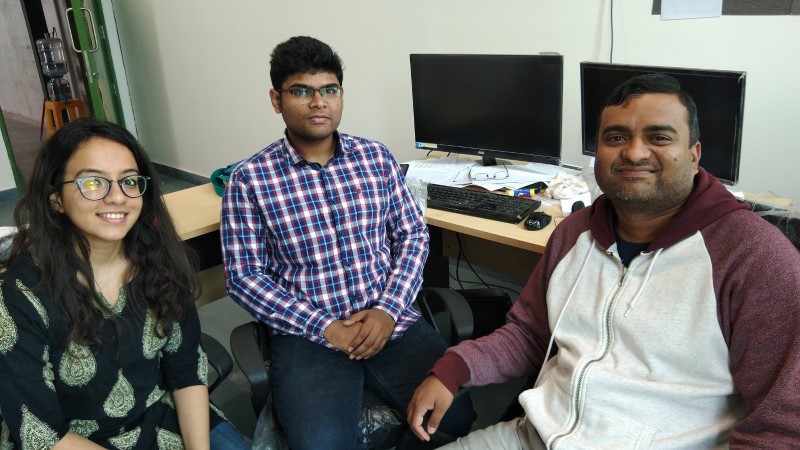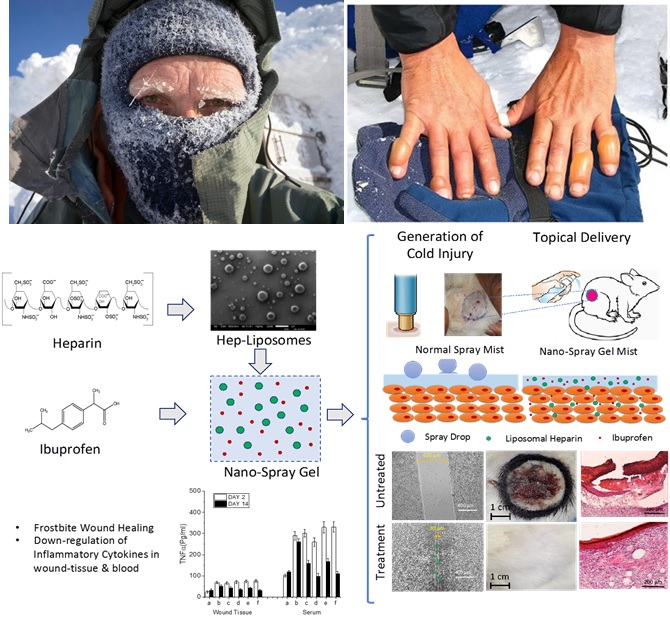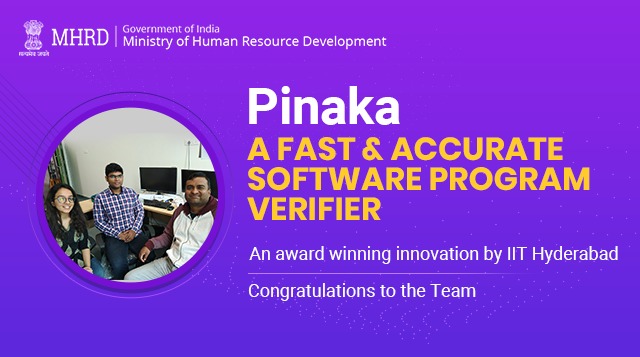Monday, January 20, 2020
Pinaka: Fast & accurate software verifier, developed at IIT Hyderabad

IITH team at SVCOMP 2020
SVCOMP is a Software Verification Competition which is the ultimate battleground for researchers around the world to prove the mettle of their verifiers on more than 10000 benchmark programs.
Pinaka, a symbolic execution engine designed and developed at IITH by Akash Banerjee, Eti Chaudhary and Dr. Saurabh Joshi participated in SVCOMP and placed 3rd in ReachSafety-Floats subcategory, 8th in ReachSafety category and 6th in Termination category. Pinaka was also one of the most accurate verifiers with only 3 errors in more than 6500 benchmarks it was run on.
3D Printed Patient Specific Medical Implants technology transferred to the Industry
CSIR-Central Scientific Instruments Organisation (CSIR-CSIO) has transferred the knowhow of “3D Printed Patient Specific Medical Implants” to the industry. The requirement of such implants may arise due to trauma, diseases like cancer or fungal infection, revision surgeries etc.
Patient Specific Implant (PSI) are required when current commercially available implant for the site are either not available or doesn’t fulfill the anatomical requirement. In those cases PSI are designed for one particular patient from the CT-Scan data and then manufactured using 3D printing technology in Titanium or other biocompatible materials. The technology has been developed by CSIR-CSIO.
PSI are also beneficial for joint salvaging surgeries e.g. when human joints are good but bone near joints area is infected or traumatized. CSIR-CSIO has developed the know-how & expertise of PSI development for load bearing & non-load bearing anatomical sites.
To read the full study, please visit:
Genome Information to Help Precise and Personalized Healthcare
Researcher from India and USA, who work to understand the genetic basis of diseases among various ethnic populations from different parts of the world, participated in a workshop organized by CSIR-Centre for Cellular and Molecular Biology (CCMB), Hyderabad. The workshop focussed on understanding genome information in a better way. Improved information on genome can help fine-tune genome-assisted healthcare, and could even lead to precise, personalized, more effective and economical approaches to healthcare.
The three-day workshop, which started on January 16, is being attended by around 200 researchers, many of whom are promising PhD scholars from research institutes, universities, hospitals and life science companies in India and USA. This workshop is arranged by the Indo-US Science and Technology Forum, supported by the Department of Science and Technology, India, and Department of State, USA, with an aim to create fruitful collaborations between the two countries.
To read more, please visit:
Study cautions about the use of designer receptors to control the brain
Chemogenetics is a technique that uses chemicals to understand how neurons are activated. It manipulates genes to place the neurons under the control of special receptors called DREADDS. Short for Designer Receptors Activated by Designer Drugs, these receptors only bind to an inert chemical called Clozapine-N-Oxide (CNO). In a recent study, researchers from the Tata Institute of Fundamental Research (TIFR), Mumbai, and Jawaharlal Nehru Center for Advanced Scientific Research (JNCASR), Bengaluru, point out specific flaws in this technique. The study was published in the journal eNeuro and funded by the Department of Science and Technology and Scientific and Engineering Research Board.
To read the full study, please visit:
New spray gel developed by INST could help take the bite out of frostbite
Scientists at the Institute of Nano Science and Technology (INST) in Mohali, an autonomous
institution under the Department of Science & Technology, have developed a cold-stable
spray gel that could be administered on-site for the immediate treatment of frostbite injuries
and heal the wound. They have titled it 'Nano-Spray Gel.'

Source: https://dst.gov.in/pressrelease/new-spray-gel-developed-inst-could-help-take-bite-out-frostbite

Source: https://dst.gov.in/pressrelease/new-spray-gel-developed-inst-could-help-take-bite-out-frostbite
Upcoming Conference Alerts: January 2020 (Mumbai)
Upcoming Conference Alerts in Mumbai
JANUARY 2020
26/01/2020
Mumbai, India
26/01/2020
Mumbai, India
26/01/2020
Mumbai, India
26/01/2020
Mumbai, India
26/01/2020
Mumbai, India
26/01/2020
Mumbai, India
31/01/2020
Mumbai, India
31/01/2020
Mumbai, India
31/01/2020
Mumbai, India
31/01/2020
Mumbai, India
31/01/2020
Mumbai, India
31/01/2020
Mumbai, India
Watch the first-ever video of individual atoms bonding and breaking
If atoms did not connect to one another, everything we know would not exist. The Sun, the Earth, animals, plants, us — we are all based on that single chemical process when two atoms bond and form matter.
IIT-B designs florets to remove impurities from industrial effluents
Researchers at the Indian Institute of Technology Bombay (IIT-B) have designed a nanocarbon particle that can help clean heavy metal pollutants from industrial effluents.
The nanocarbon particles or florets that look like marigolds, can remove 90% of pollutants including arsenic, chromium, cadmium and mercury from industrial effluents, claim the researchers.
The work by the team led by professor C Subramaniam was published in the ACS Applied Nano Materials journal recently.
To read the full article, please visit:
The short list: 24 books, each under 200 pages, as recommended by TED speakers
Time is precious, we know. Here, compiled from past reading lists, are suggestions for two dozen short but mighty books to pick up.
To read the full story, please visit:
Subscribe to:
Comments (Atom)
Featured Posts
-
READING INSPIRATION DAY 2021 We salute APJ Abdul Kalam and celebrate his monumental achievements as a Scientist, Scholar and the President...
-
UGC-CARE has received complaints about several journals which are not following the standard publishing practices. After scrutinizing these...
-
🎉 Celebrate Marathi Bhasha Diwas with Your Creativity! 🎉 In honor of Marathi Bhasha Diwas on 27th February, the Learning and Information ...





